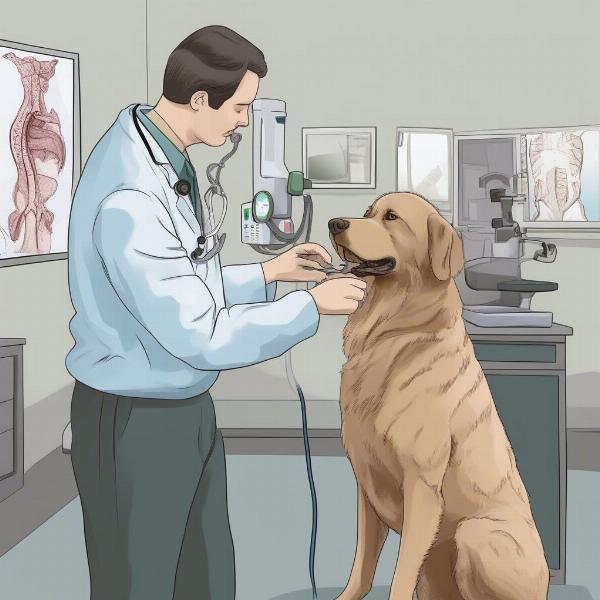Parainfluenza in dogs is a highly contagious respiratory infection that can cause kennel cough. The parainfluenza vaccine for dogs is a crucial step in protecting your furry friend from this unpleasant illness. This article will delve into everything you need to know about the parainfluenza vaccine, including its benefits, potential side effects, and why it’s so important for your dog’s overall health.
Understanding Canine Parainfluenza
Canine parainfluenza is a viral infection that affects a dog’s respiratory system. It’s one of the most common causes of kennel cough, a complex respiratory disease often involving multiple pathogens. Symptoms typically include a dry, hacking cough, sometimes accompanied by sneezing, runny nose, and lethargy. While usually not life-threatening, parainfluenza can be particularly dangerous for puppies, senior dogs, and dogs with compromised immune systems.
Why Vaccinate Your Dog Against Parainfluenza?
The parainfluenza vaccine significantly reduces the risk of your dog contracting the virus and developing kennel cough. While the vaccine might not completely prevent infection, it typically lessens the severity and duration of the illness. This is particularly important for dogs who frequently interact with other dogs, such as at dog parks, doggy daycare, or kennels. By vaccinating your dog, you’re not only protecting them but also contributing to the overall health of the canine community.
Parainfluenza Vaccine Schedule and Administration
The parainfluenza vaccine is often included in combination vaccines, such as the DHPP (Distemper, Hepatitis, Parvovirus, Parainfluenza) or the DA2PP (Distemper, Adenovirus Type 2, Parvovirus, Parainfluenza). Puppies typically receive their first dose around 6-8 weeks of age, followed by booster shots every 3-4 weeks until they are 16 weeks old. 7 in one shot for dogs provides more comprehensive protection. Adult dogs usually require annual or triennial boosters, depending on the specific vaccine used and your veterinarian’s recommendation. What is c5 vaccination for dogs also offers valuable information on common canine vaccinations.
Potential Side Effects of the Parainfluenza Vaccine
Like any vaccine, the parainfluenza vaccine can sometimes cause mild side effects. These may include soreness at the injection site, mild fever, or lethargy. These reactions are typically short-lived and resolve on their own. In rare cases, more serious allergic reactions can occur. If you notice any unusual symptoms after vaccination, such as difficulty breathing, facial swelling, or hives, contact your veterinarian immediately.
Is the Parainfluenza Vaccine Right for Your Dog?
The parainfluenza vaccine is generally recommended for most dogs, especially those who are regularly exposed to other dogs. However, certain factors, such as pre-existing health conditions, may influence the decision. It’s always best to discuss your dog’s individual needs and vaccination schedule with your veterinarian. Spectra dog vaccine schedule might be a useful resource to understand different vaccine options. They can provide personalized advice based on your dog’s age, breed, lifestyle, and overall health.
 Veterinarian Examining a Dog
Veterinarian Examining a Dog
Parainfluenza vs. Bordetella: What’s the Difference?
While both parainfluenza and Bordetella bronchiseptica can contribute to kennel cough, they are distinct pathogens. Parainfluenza is a virus, while Bordetella is a bacterium. Both vaccines are often given together to provide comprehensive protection against kennel cough. 9 in one dog vaccine and 7 way dog vaccine offer comprehensive protection.
Conclusion
Protecting your dog from parainfluenza is a crucial part of responsible pet ownership. The parainfluenza vaccine is a safe and effective way to minimize the risk of infection and contribute to your dog’s overall well-being. Consult your veterinarian to determine the appropriate vaccination schedule for your furry friend.
FAQ
- What is the parainfluenza vaccine for dogs? It’s a vaccine that helps protect dogs from canine parainfluenza virus, a common cause of kennel cough.
- How often does my dog need the parainfluenza vaccine? This varies depending on your dog’s age, lifestyle, and specific vaccine used. Consult your veterinarian for personalized advice.
- Is the parainfluenza vaccine safe? Generally, yes. While mild side effects can occur, they are typically short-lived.
- Can my dog still get kennel cough even after vaccination? While the vaccine significantly reduces the risk, it might not provide complete immunity. However, vaccinated dogs often experience milder symptoms.
- What are the signs of parainfluenza in dogs? The most common sign is a dry, hacking cough, which can be accompanied by other respiratory symptoms.
- What should I do if my dog develops side effects after vaccination? Contact your veterinarian immediately if you notice any unusual or concerning symptoms.
- Is the parainfluenza vaccine recommended for all dogs? While generally recommended, certain factors may influence the decision. Consult your veterinarian for personalized advice.
About ILM Dog
ILM Dog (ilmdog.com) is your trusted global resource for comprehensive dog care and breed information. We offer expert advice on dog health, training, nutrition, grooming, and much more, catering to both new and experienced dog owners. From breed selection to senior dog care, ILM Dog provides practical, reliable information to help you provide the best possible care for your furry companion. Contact us for personalized guidance: [email protected] or +44 20-3965-8624.